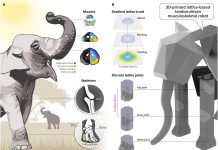
In a new study, researchers have predicted that a future ‘human brain/cloud interface’ can help people access to the world’s knowledge and artificial intelligence instantly just via thought.
The new interface can greatly change our communications, education, and work.
The study was led by researchers at UC Berkeley and the US Institute for Molecular Manufacturing.
In the study, the team suggests that developments in nanotechnology, nanomedicine, AI, and computation will eventually lead to a “Human Brain/Cloud Interface” (B/CI) that connects brain cells to vast cloud-computing networks in real time.
In the interface, neural nanorobots can be connected to the neocortex of the human brain to a “synthetic neocortex” in the cloud.
The neural nanorobots can provide direct, real-time monitoring and control of signals to and from brain cells.
They can wirelessly transmit encoded information to and from a cloud-based supercomputer network for real-time brain-state monitoring and data extraction.
According to the team, the brain cortex in the cloud would allow “Matrix”-style downloading of information to the brain.
This could empower people with instantaneous access to all cumulative human knowledge available in the cloud.
Humans with this ability can greatly improve their learning capacities and intelligence.
The new interface can also allow human to create a future “global superbrain” that connects individual human brains and AIs to enable collective thought.
It can harness the thoughts and thinking power of any number of humans and machines in real time.
The team suggests that the shared cognition can revolutionize democracy, enhance empathy, and unite culturally diverse groups into a truly global society.
Currently, scientists have tested an experimental human ‘BrainNet’ system, which enables thought-driven information exchange via the cloud between individual brains.
One challenge is it is hard to find the bandwidth for global data transmission. Another challenge is it is hard to enable data exchange with neurons via tiny devices embedded deep in the brain.
The researchers propose to use ‘magnetoelectric nanoparticles’ to effectively amplify communication between neurons and the cloud.
The senior author of the study is Robert Freitas, Jr.
The study is published in Frontiers in Neuroscience.
Copyright © 2019 Knowridge Science Report. All rights reserved.



